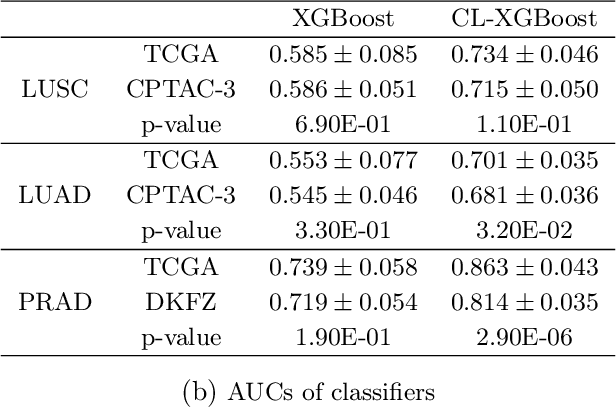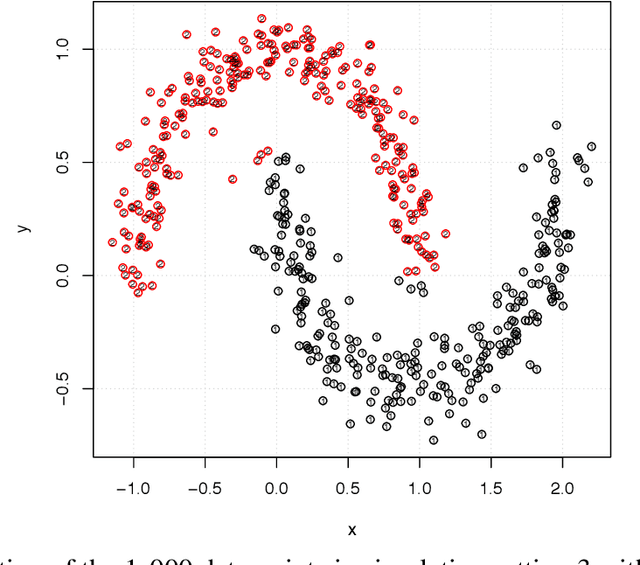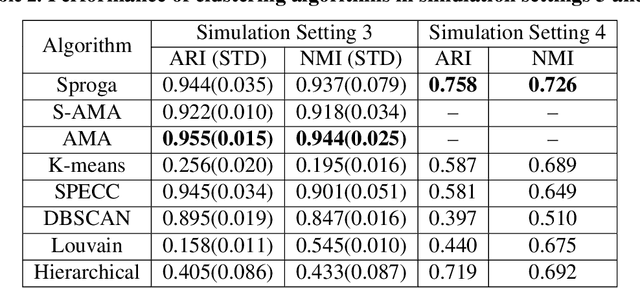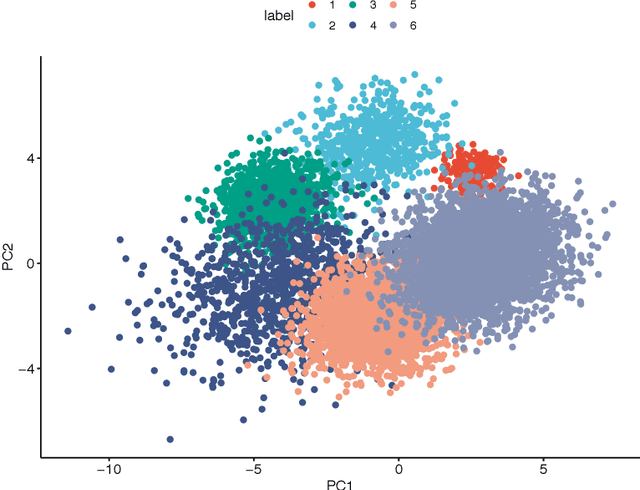Xiaodong Cai
Deep Semi-Supervised Survival Analysis for Predicting Cancer Prognosis
Jan 28, 2026Abstract:The Cox Proportional Hazards (PH) model is widely used in survival analysis. Recently, artificial neural network (ANN)-based Cox-PH models have been developed. However, training these Cox models with high-dimensional features typically requires a substantial number of labeled samples containing information about time-to-event. The limited availability of labeled data for training often constrains the performance of ANN-based Cox models. To address this issue, we employed a deep semi-supervised learning (DSSL) approach to develop single- and multi-modal ANN-based Cox models based on the Mean Teacher (MT) framework, which utilizes both labeled and unlabeled data for training. We applied our model, named Cox-MT, to predict the prognosis of several types of cancer using data from The Cancer Genome Atlas (TCGA). Our single-modal Cox-MT models, utilizing TCGA RNA-seq data or whole slide images, significantly outperformed the existing ANN-based Cox model, Cox-nnet, using the same data set across four types of cancer considered. As the number of unlabeled samples increased, the performance of Cox-MT significantly improved with a given set of labeled data. Furthermore, our multi-modal Cox-MT model demonstrated considerably better performance than the single-modal model. In summary, the Cox-MT model effectively leverages both labeled and unlabeled data to significantly enhance prediction accuracy compared to existing ANN-based Cox models trained solely on labeled data.
LongCat-Flash-Thinking-2601 Technical Report
Jan 23, 2026Abstract:We introduce LongCat-Flash-Thinking-2601, a 560-billion-parameter open-source Mixture-of-Experts (MoE) reasoning model with superior agentic reasoning capability. LongCat-Flash-Thinking-2601 achieves state-of-the-art performance among open-source models on a wide range of agentic benchmarks, including agentic search, agentic tool use, and tool-integrated reasoning. Beyond benchmark performance, the model demonstrates strong generalization to complex tool interactions and robust behavior under noisy real-world environments. Its advanced capability stems from a unified training framework that combines domain-parallel expert training with subsequent fusion, together with an end-to-end co-design of data construction, environments, algorithms, and infrastructure spanning from pre-training to post-training. In particular, the model's strong generalization capability in complex tool-use are driven by our in-depth exploration of environment scaling and principled task construction. To optimize long-tailed, skewed generation and multi-turn agentic interactions, and to enable stable training across over 10,000 environments spanning more than 20 domains, we systematically extend our asynchronous reinforcement learning framework, DORA, for stable and efficient large-scale multi-environment training. Furthermore, recognizing that real-world tasks are inherently noisy, we conduct a systematic analysis and decomposition of real-world noise patterns, and design targeted training procedures to explicitly incorporate such imperfections into the training process, resulting in improved robustness for real-world applications. To further enhance performance on complex reasoning tasks, we introduce a Heavy Thinking mode that enables effective test-time scaling by jointly expanding reasoning depth and width through intensive parallel thinking.
VitaBench: Benchmarking LLM Agents with Versatile Interactive Tasks in Real-world Applications
Sep 30, 2025Abstract:As LLM-based agents are increasingly deployed in real-life scenarios, existing benchmarks fail to capture their inherent complexity of handling extensive information, leveraging diverse resources, and managing dynamic user interactions. To address this gap, we introduce VitaBench, a challenging benchmark that evaluates agents on versatile interactive tasks grounded in real-world settings. Drawing from daily applications in food delivery, in-store consumption, and online travel services, VitaBench presents agents with the most complex life-serving simulation environment to date, comprising 66 tools. Through a framework that eliminates domain-specific policies, we enable flexible composition of these scenarios and tools, yielding 100 cross-scenario tasks (main results) and 300 single-scenario tasks. Each task is derived from multiple real user requests and requires agents to reason across temporal and spatial dimensions, utilize complex tool sets, proactively clarify ambiguous instructions, and track shifting user intent throughout multi-turn conversations. Moreover, we propose a rubric-based sliding window evaluator, enabling robust assessment of diverse solution pathways in complex environments and stochastic interactions. Our comprehensive evaluation reveals that even the most advanced models achieve only 30% success rate on cross-scenario tasks, and less than 50% success rate on others. Overall, we believe VitaBench will serve as a valuable resource for advancing the development of AI agents in practical real-world applications. The code, dataset, and leaderboard are available at https://vitabench.github.io/
LexSemBridge: Fine-Grained Dense Representation Enhancement through Token-Aware Embedding Augmentation
Aug 25, 2025Abstract:As queries in retrieval-augmented generation (RAG) pipelines powered by large language models (LLMs) become increasingly complex and diverse, dense retrieval models have demonstrated strong performance in semantic matching. Nevertheless, they often struggle with fine-grained retrieval tasks, where precise keyword alignment and span-level localization are required, even in cases with high lexical overlap that would intuitively suggest easier retrieval. To systematically evaluate this limitation, we introduce two targeted tasks, keyword retrieval and part-of-passage retrieval, designed to simulate practical fine-grained scenarios. Motivated by these observations, we propose LexSemBridge, a unified framework that enhances dense query representations through fine-grained, input-aware vector modulation. LexSemBridge constructs latent enhancement vectors from input tokens using three paradigms: Statistical (SLR), Learned (LLR), and Contextual (CLR), and integrates them with dense embeddings via element-wise interaction. Theoretically, we show that this modulation preserves the semantic direction while selectively amplifying discriminative dimensions. LexSemBridge operates as a plug-in without modifying the backbone encoder and naturally extends to both text and vision modalities. Extensive experiments across semantic and fine-grained retrieval tasks validate the effectiveness and generality of our approach. All code and models are publicly available at https://github.com/Jasaxion/LexSemBridge/
Dynamic Analysis of Corporate ESG Reports: A Model of Evolutionary Trends
Sep 13, 2023Abstract:Environmental, social, and governance (ESG) reports are globally recognized as a keystone in sustainable enterprise development. This study aims to map the changing landscape of ESG topics within firms in the global market. A dynamic framework is developed to analyze ESG strategic management for individual classes, across multiple classes, and in alignment with a specific sustainability index. The output of these analytical processes forms the foundation of an ESG strategic model. Utilizing a rich collection of 21st-century ESG reports from technology companies, our experiment elucidates the changes in ESG perspectives by incorporating analytical keywords into the proposed framework. This work thus provides an empirical method that reveals the concurrent evolution of ESG topics over recent years.
Contrastive Learning for Predicting Cancer Prognosis Using Gene Expression Values
Jun 09, 2023



Abstract:Several artificial neural networks (ANNs) have recently been developed as the Cox proportional hazard model for predicting cancer prognosis based on tumor transcriptome. However, they have not demonstrated significantly better performance than the traditional Cox regression with regularization. Training an ANN with high prediction power is challenging in the presence of a limited number of data samples and a high-dimensional feature space. Recent advancements in image classification have shown that contrastive learning can facilitate further learning tasks by learning good feature representation from a limited number of data samples. In this paper, we applied supervised contrastive learning to tumor gene expression and clinical data to learn feature representations in a low-dimensional space. We then used these learned features to train the Cox model for predicting cancer prognosis. Using data from The Cancer Genome Atlas (TCGA), we demonstrated that our contrastive learning-based Cox model (CLCox) significantly outperformed existing methods in predicting the prognosis of 18 types of cancer under consideration. We also developed contrastive learning-based classifiers to classify tumors into different risk groups and showed that contrastive learning can significantly improve classification accuracy.
An Efficient Smoothing Proximal Gradient Algorithm for Convex Clustering
Jun 22, 2020



Abstract:Cluster analysis organizes data into sensible groupings and is one of fundamental modes of understanding and learning. The widely used K-means and hierarchical clustering methods can be dramatically suboptimal due to local minima. Recently introduced convex clustering approach formulates clustering as a convex optimization problem and ensures a globally optimal solution. However, the state-of-the-art convex clustering algorithms, based on the alternating direction method of multipliers (ADMM) or the alternating minimization algorithm (AMA), require large computation and memory space, which limits their applications. In this paper, we develop a very efficient smoothing proximal gradient algorithm (Sproga) for convex clustering. Our Sproga is faster than ADMM- or AMA-based convex clustering algorithms by one to two orders of magnitude. The memory space required by Sproga is less than that required by ADMM and AMA by at least one order of magnitude. Computer simulations and real data analysis show that Sproga outperforms several well known clustering algorithms including K-means and hierarchical clustering. The efficiency and superior performance of our algorithm will help convex clustering to find its wide application.
 Add to Chrome
Add to Chrome Add to Firefox
Add to Firefox Add to Edge
Add to Edge